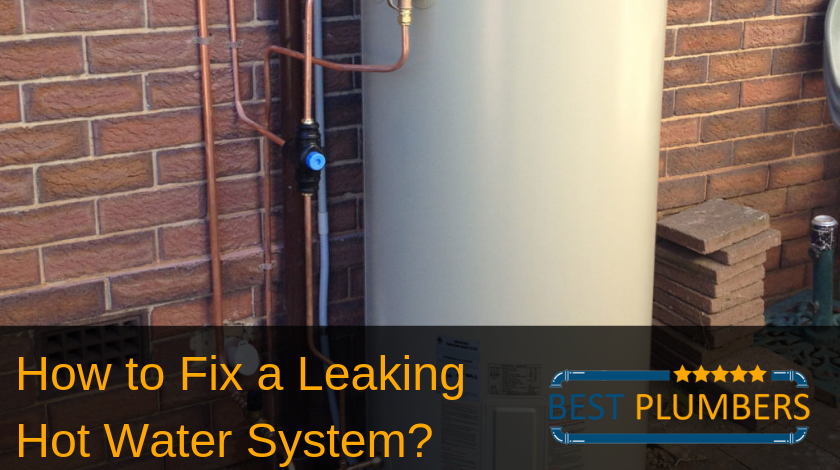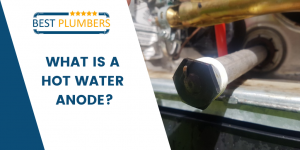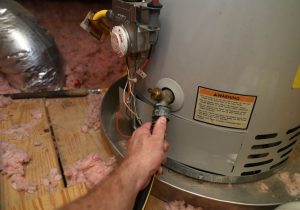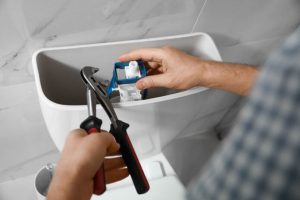There’s no doubt, having a leaking hot water system in your home or apartment can be quite troubling. After all. water leaks and cold showers are both things you don’t want to prolong!
It may present itself suddenly as water streams over your flooring. Or maybe you’ve noticed your hot water pressure is low. A high water bill is also an indication something is wrong with you plumbing.
Depending on the cause, the good news is that there is a quick fix for your hot water system leaking dilemma. To repair a leaky water heater, the first thing to do is to determine the cause of the issue. For instance, a water heater may become leaky as a result of age, poor maintenance, excessive tank pressure, a loose drain valve, or bad plumbing during installation.
Where is your hot water system leaking from?
Is it pipes or fittings?
Leaks can occur at the connections between the tank and the inlet or outlet pipes if they are loose or have worn gaskets. However, a problem like that can be rectified – all you need do is to fasten the valve as soon as you notice it is loose or replace the gaskets.
Also, the water heater may be damaged as a result of excessive pressure to the tank. Such high pressure can be caused by a faulty pressure relief valve and too much pressure coming into the water heater. For such issues, it is best advised to contact a local plumber, as it can be dangerous and complicated to handle.
Do you have a leaking tempering valve? Also known as a mixing valve or a hot water tempering valve, this is a safety device installed on the outlet of hot water systems to regulate the temperature of the hot water supplied to taps and fixtures. It may have a problem with the seal or is corroded and needing replacement.
Is your hot water tank leaking?
If your hot water system is leaking from the top, it’s likely around the sacrificial anode. The anode is a crucial component of a hot water system designed to protect the tank from corrosion. It is designed to corrode instead of the tank itself. If significantly corroded, it may no longer effectively protect the tank and can lead to leaks.
The reason for a tank leaking from the bottom can be several years worth of rust and sediment piling up at the base of the tank. If care is not taken, the base of the tank will rust and eventually become leaky. Flushing your hot water tank is a maintenance task that can prevent this becoming an issue. It’s especially important in areas with hard water.
Cracks can develop in the tank due to manufacturing defects, wear and tear, or damage. Even small cracks can cause significant leaks and would need a replacement of the tank, which is essentially a new system. Excessively high water pressure can cause strain on the tank, leading to cracks and leaks. It is important to maintain the correct water pressure to avoid damage to the hot water system.
Condensation vs. Actual Leaks
Not all moisture around your hot water system means there’s a leak. Sometimes, what looks like a leak is just condensation. This happens when cold water enters the tank and causes moisture to form on the outside, especially in humid or cool conditions. High-efficiency water heaters are more prone to condensation, particularly during heavy use or after the first heating cycle.
To check if it’s condensation or a leak, wipe down the tank and the surrounding pipes. If water reappears quickly, it could be an actual leak from a valve, fitting, or the tank itself. If it stays dry, it was likely just condensation. Either way, regular inspections can help ensure small issues don’t turn into costly repairs.
Leaking hot water system repair
Replacing or Fixing a Leaking Hot Water System?
The scale or the cause of the leak are the most significant factors. In many instances, a leaking hot water system can be fixed, while in others, a replacement is the only or best option. In the latter case, most homeowners end up replacing the broken system with an identical or near-identical unit or replacing an electric hot water system with a gas powered unit.
Ideally, water heaters work well for many years although how long a hot water unit lasts does depend on regular maintenance, with 10 – 20 years being a good lifespan. If your hot water system is in that range then there is a good chance that old age is responsible for your hot water system leaking it may be time for a replacement.
Hot water system leaks from fittings and pipes can be repaired. If the leak is from the tank you may be able to repair it with an anode replacement, but a crack is fatal. Here are some specific hot water leak repair steps depending on the source.
Replacing a leaking hot water anode
Changing a hot water anode will prolong the life of your hot water system and inhibit tank corrosion. It should be located under a cap or cover on the top of the storage tank.
- Turn off the power and water supply and drain the tank.
- Using a pipe wrench or adjustable wrench, loosen and unscrew the anode rod from the tank.
- Apply Teflon tape to the threads of the new anode rod in a clockwise direction to help create a watertight seal.
- Insert the new anode rod into the tank, ensuring that it is tightened securely, but not overtightened, as this could damage the threads or tank.
- Reconnect the power and water supply, checking for any leaks.
How to change a water heater pressure relief valve
It is possible that the pressure relief valve on a water heater is leaking or failed due to excessive pressure, in which case the water pressure in the system should be checked and adjust if necessary. If the valve is faulty, it can be replaced with a new one, the steps are below.
- Switch off the water heater and cut off the water supply. Then, remove some water from the tank
- Discharge the rest of the pressure by lifting the small lever on the valve
- With a wrench, unscrew the valve from the tank. Then, put in the new valve
- On the threads of the new valve, there is Teflon tape. Apply it before screwing it into the water heater
- By now, you can safely refill the water heater tank. Then, activate it
- Some of the other possible leaks may require only tightening the fittings on the water heater and the supply pipes. Also, check and tighten any loose valves too.
Leaking Hot Water System Replacement
Depending where your hot water system is leaking from, you may like to have a go at fixing your system by yourself. However, for your safety and compliance you should always call on an expert for gas or electric hot water system replacement. Here’s what the steps involve, but remember the connection and disconnection of gas or electricity is something you should not attempt unless qualified.
Shut Off Utilities
If there is a water supply connected to the water heater, shut it off. Also, if you are using an electric water heater, deactivate the electrical power. Or, if your water heater is powered by gas, shut off the gas supply.
Drain the Hot water tank
Open the valve at the base of the water heater tank close to the floor to drain out the water from the tank. You may find a garden hose useful in the process – attach it to the drain valve and pass it to the closest drain. This will save you from messing up your floor.
Disconnecting the leaking hot water system
After you have emptied the tank, disconnect the gas line, water lines, and flue pipe if you are using a gas water heater, or the water lines and the power wires if you own an electric water heater. It is possible that the water heater and storage tank is still very heavy, so use a dolly to take it out of your place.
Install the new hot water system
After the removal of the faulty water heater, clear and clean up the position for the new water heater. Get the new water heater into the correct position and start to reconnect it to the water lines. Afterwards, connect the gas supply and the flue pipe for a gas water heater, or the power supply for an electric water heater. In the case of a gas water heater, ensure that you assess the gas line joints using soap bubbles to check for any leaks.
Then, activate the power/gas supply and start to refill the water tank. If you are using a gas water heater, attempt to ignite the pilot light. Also, check the thermostat and be sure that the hot water temperature is set to the preferred temperature. By now, you can enjoy your newly installed water heater.
Reminder: If you’re planning on getting a gas hot water system repaired or replaced, you might want to make sure they are fully licensed and can provide you with a Gas Compliance Certificate.
Hot Water Leak Prevention
Preventing leaks before they happen can save you money and extend the life of your hot water system. Here are a few key steps:
Regular Maintenance
Over time, sediment can build up inside the tank, reducing efficiency and increasing the risk of overheating or corrosion. Flushing the system once a year helps remove this buildup, keeping the heater running smoothly. It also allows you to check for early signs of wear and tear, so small problems can be fixed before they turn into leaks.
Check the Anode Rod
The anode rod is a crucial but often overlooked part of your electric tank hot water system. Its job is to attract corrosive elements, preventing rust inside the tank. If the rod deteriorates completely, the tank itself starts to corrode, leading to leaks. Checking the anode rod every couple of years and replacing it when needed can significantly extend the life of your hot water system.
Monitor Water Pressure
Excessively high water pressure can put unnecessary strain on your hot water system, leading to leaks or damage to pipes and valves. A pressure-reducing valve (PRV) installed at the main water supply can help regulate pressure levels. If you notice banging pipes or constant dripping from the pressure relief valve, it may be time to check and adjust your home’s water pressure.
By staying on top of maintenance and keeping an eye on key components, you can prevent leaks and get the most out of your hot water system.
Call in local hot water plumbers
When it comes to fixing or replacing a leaking hot water system, it’s essential to enlist the help of local, licensed hot water plumbers. Not only do they possess the necessary tools and expertise, but they can also provide you with valuable advice on the most efficient and up-to-date hot water systems. They will ensure that all safety guidelines are followed and that the installation or repair is completed correctly, with the appropriate certifications and documentation, giving you peace of mind knowing that your hot water system is compliant with local regulations.
Get in touch for top local hot water services with fixed pricing and high quality workmanship. Below are just a few of the communities our members proudly serve.
- Hot Water Systems Sydney
- Hot water Systems Penrith
- Hot Water Systems Melbourne
- Hot Water Systems Brisbane
- Hot Water Systems Gold Coast
- Hot Water Systems Newcastle
So, don’t hesitate to call in the experts when faced with a leaking hot water system, anywhere in Australia. Trust the professionals at Best Plumbers Club to help you resolve your hot water woes and keep your home running smoothly.







